Kenneth Yeung looks at why Asterix is enduringly popular in Indonesia.

French comic book hero Asterix was first translated into Indonesian in 1982 and has never been out of print. The series’ universal themes of human folly and cunning are particularly relevant to Indonesia, despite the stories being set in 50 B.C. If you’ve never read Asterix, now’s the time to start.
1. Political Corruption – Book: Asterix in Switzerland (1970)

Book: Asterix in Switzerland (1970)
Classic quote: “I have one year to get rich!”
Political corruption is nothing new, but it’s beautifully presented in Asterix in Switzerland. The Roman governor of Condatum (now Rennes in northwestern France) is leading a debauched life of one long orgy, funded by embezzling most of the province’s taxes. When a state auditor arrives, the governor tries to corrupt him. When that fails, he tries to murder him. Not a million miles away from throwing acid in the face of an anti-corruption official and then emasculating the anti-corruption watchdog. Wonderfully, the Indonesian version of this book replaces some of the explicit Roman references with terms like “ini buat Negara (this is for the state)” and “BPK (State Audit Agency)”.
Other themes: Incompetent doctors.
2. Forcing ‘Barbarians’ to Accept Civilization by Destroying their Forest-Book: The Mansions of the Gods (1971)
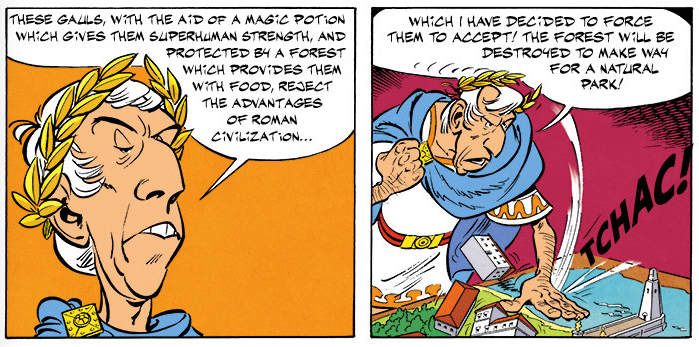
Book: The Mansions of the Gods (1971)
Classic Quote: “The forest will be destroyed to make way for a natural park!”
Julius Caesar is determined to conquer Asterix’s village of indomitable Gauls, who refuse to accept the glorious benefits of Roman occupation. Caesar’s plan is to destroy the Gauls’ forest and erect blocks of flats filled with Roman tenants. Clearing a forest to create space for luxury housing, with the ulterior motive of making the primitive, indigenous savages a minority in their own land. Sound familiar?
Other themes: Environmental conservation, marketing lies.
3. Bureaucracy that Sends You Mad – Book: Asterix the Legionary (1968)

Book: Asterix the Legionary (1968)
Quote: “Where do I find the Information Bureau, please?” “No idea. Apply to the Information Bureau.”
Asterix simply wants some information, but is sent all over an army-run office block and makes zero progress until he finally loses his temper. This concept was further explored in the 1976 cartoon film, The Twelve Tasks of Asterix, where one of the tasks is to obtain a form from “the place that sends you mad” – a government office filled with infuriatingly unhelpful bureaucrats. Indonesia would score better on the World Bank’s Ease of Doing Business Index if it had fewer places that send you mad.
Other themes: Military incompetence, sadistic military officers.
4. Conmen Cloaked as Fortune Tellers – Book: Asterix and the Soothsayer (1972)

Book: Asterix and the Soothsayer (1972)
Quote: “In short, they are charlatans who thrive on credulity, fear and human superstition.”
Asterix’s village is visited by a soothsayer, who preys on the stupidity of superstitious people to enrich himself. Sadly, not a week goes by in Indonesia without news of people being fleeced by unscrupulous dukun (shaman).
Other themes: None, you can fill a book with the stupidity of superstition.
5. Electioneering – Book: Asterix and Caesar’s Gift (1974)
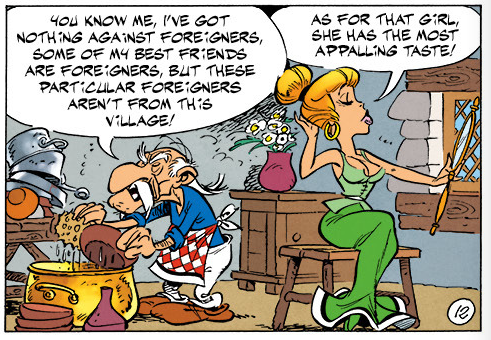
Quote: “I’ve got nothing against foreigners, some of my best friends are foreigners, but these particular foreigners aren’t from this village!”
Dirty politics, vote-buying and brazen exploitation of xenophobia. It sounds like a chapter from a history of elections in Indonesia. The book also looks at ambitious wives (who married below their station) pushing their husbands to seek political power, for the sake of social prestige and family glory.
Other themes: Sexpionage, henpecked husbands.
6. Ingratitude to Invaders – Book: Asterix at the Olympic Games (1968)
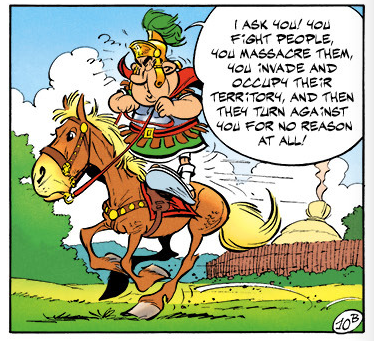
Quote: “You fight people, you massacre them, you invade and occupy their territory, and then they turn against you for no reason at all!”
Asterix is selected to represent Gaul at the Olympic Games, much to the chagrin of the Romans, who feel that colonized people should be kept in their place. Obviously, the only connection to Indonesia is the Dutch colonization of the East Indies. Nothing else. Please don’t ask why there aren’t more Papuans in Indonesia’s national football squads.
Other themes: Corruption and doping in sport.
7. Divide and Rule – Book: Asterix and the Roman Agent (1970)
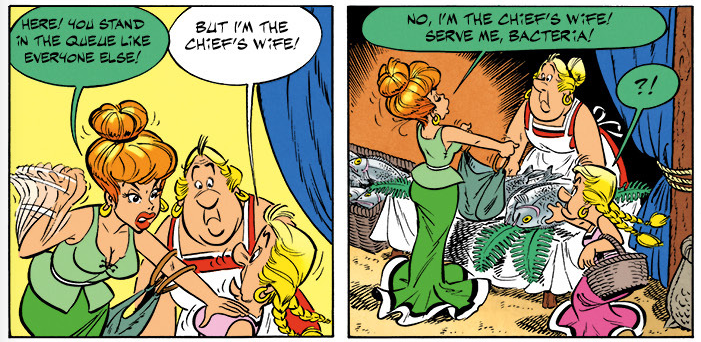
Book: Asterix and the Roman Agent (1970)
Quote: “What about buying them off? Sow discord to split them up.”
Some critics rate this as one of the funniest Asterix books. It’s all about Julius Caesar’s maxim of “divide and rule”. Instead of fighting against a common enemy, people are manipulated into fighting among themselves. The Dutch used this tactic in governing the Dutch East Indies. President Suharto also became a master of “divide and rule”.
Other themes: Fake news, toxic gossip, queue-jumping.
8. We Must Corrupt Them – Book: Obelix and Co. (1976)

Book: Obelix and Co. (1976)
Quote: “The profit motive will enfeeble them and keep them busy. We must corrupt them.”
The finest economics textbook ever written, this story explores how greed can be used to subdue rebels. Much like Indonesia’s non-military efforts to deal with separatism, this method has mixed results. There’s a nice scene in the book where once youthful, brave Roman soldiers have grown into corpulent, decadent politicians with a fondness for forming think-tanks, commissions and subcommittees, and holding working lunches. Just look at how some previously slim, idealistic political activists in Indonesia have now become corpulent establishment figures.
Other themes: Vanity, hideously ridiculous expensive fashions.
9. Rigged Elections – Book: Asterix in Corsica (1973)
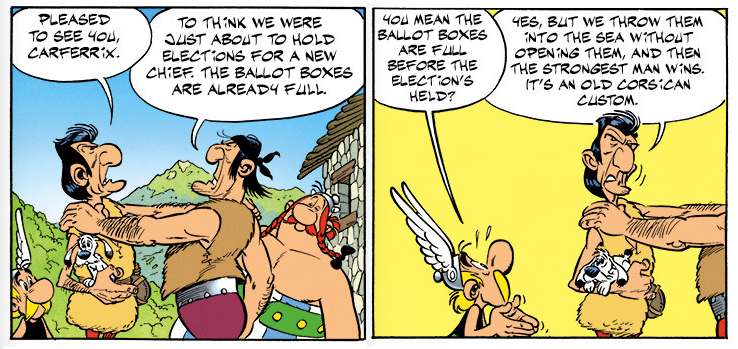
Classic Quote: “We were just about to hold elections for a new chief. The ballot boxes are already full.”
In the messy arena of Corsican politics, elections are rigged and sometimes settled by brute force. Compare that to Indonesia’s Suharto era elections, where the outcome was always known in advance and brute force was used to silence genuine political opposition.
Other themes: Indolence.
10. Coronavirus! – Book: Asterix and the Chariot Race (2017)

Quote: “Coronavirus! Coronavirus! Coronavirus!”
One of the competitors in a chariot race across Ancient Italy is a Roman named Coronavirus – although his real name is Testus Terone – and he’s a caricature of French Formula 1 racing driver Alain Prost. What’s the connection to Indonesia? Nothing, apart from the endless chanting of “Coronavirus!” Published two years before the outbreak of COVID-19, this subpar book is neither prescient nor prophetic. It was simply the new writer of the series fishing for a topical, amusing Roman name ending in –us.
Other themes: Poorly maintained roads, private orgies, cheating in sport.
What’s Next & Where?
Asterix is yet to have an adventure set in Indonesia. Despite the deaths of the series’ co-creators, Rene Goscinny (died November 1977) and Albert Uderzo (died March 2020), the series is being continued – so there’s a chance Asterix could end up visiting Indonesia. He was headed to the more lucrative shores of China for a new live-action film due to start shooting this year, but production has been postponed due to coronavirus. When the new writers of the series need some inspiration for a comical setting for a future adventure, they need look no further than the people, politics and places of Indonesia.




